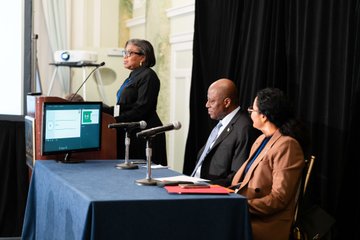
As September Inflation Falls To 18.02%, 3-Year Low
Photo Caption: As part of ongoing efforts to bolster investor confidence and enhance Nigeria’s economic outlook, the Governor of the Central Bank of Nigeria (CBN), Olayemi Cardoso, and the Minister of State for Finance, Dr. Doris Uzoka-Anite, engaged global investors at a high-level forum on October 15, 2025, during the IMF and World Bank Fall Meetings in Washington, D.C. They were joined by the CBN Deputy Governor (Economic Policy), Mohammed Abdullahi; the Special Adviser to the President on Finance and the Economy, Mrs. Sanyade Okoli; and the Director-General of the Debt Management Office, Mrs. Patience Oniha, among other senior officials, the session offered a comprehensive update on Nigeria’s macroeconomic reforms, fiscal-monetary coordination, and policy initiatives shaping the country’s growth trajectory.
The Central Bank of Nigeria (CBN) has reiterated its commitment to strengthening the disinflation trend in the country, amid the combination of exchange rate stability, durable improvements in food supply, and continued moderation in petroleum product prices.
Nigeria’s foreign reserves rose above $43 billion, representing over 11 months of forward import cover, supported by sustained forex inflows.
Governor of the CBN, Olayemi Cardoso told newsmen at the ongoing Annual meetings of the International Monetary Fund and the World Bank Group, that the bank expects “inflation to continue to trend downward in the near term, supported by tight monetary conditions, a stable naira, and increased food supply.”

Mrs. Oniha addressing the gathering
Nigeria’s headline inflation rate fell for the sixth consecutive month in September, easing to 18.02%, its lowest level in three years. according to new data released by the National Bureau of Statistics (NBS) on Wednesday.
Core inflation, according to the report slowed to 19.53%, while food inflation moderated to 16.87% over the same period.
The sustained decline marks a significant reversal from the inflationary peak of 34.19% in June 2024, reflecting the impact of the CBN decisive monetary policy actions to restore price stability and anchor expectations.
In response to those pressures, the CBN raised its Monetary Policy Rate (MPR) from 18.75% to 27.5% through a sustained tightening cycle, while increasing the Cash Reserve Ratio (CRR) to 50% for commercial banks and 16% for merchant banks. At its September 2025 meeting, the bank eased slightly, lowering the MPR by 50 basis points to 27.00 percent and the CRR for commercial banks to 45%, while maintaining a firm anti-inflationary stance.
Monetary tightening was complemented by reforms in the foreign exchange market, including exchange rate unification and enhanced transparency to improve price discovery in the market. The naira has since stabilized, with the spread between the official and Bureau de Change (BDC) rates narrowing to below 2 percent. Improved liquidity in the FX market has helped reduce the pass through of imported inflation and reinforced price stability.















